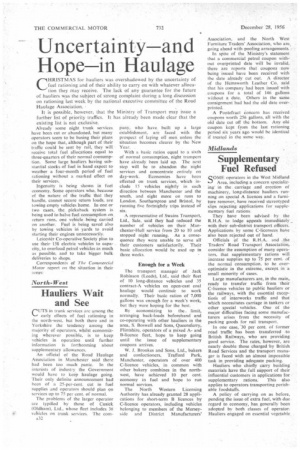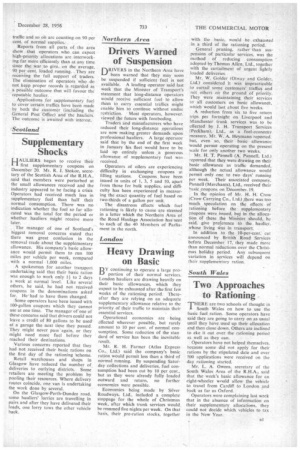Midlands
Page 34

Page 35

If you've noticed an error in this article please click here to report it so we can fix it.
Supplementary Fuel Refused
SCOME operators in the West Midland Area, including a concern specializing in the.. carriage and erection of machinery. -long-distance hauliers running on special A licences and a furniture remover, have received stereotyped slips rejecting applications for supplementary fuel rations
They have been advised by the R.H.A. to lodge appeals immediately _ with their sub-district transport officers. Applications by some C-licensees have also been rejected out of hand.
Officials of the R.H.A. and the Traders' Road Transport Association, consider the assumption of many operators, that supplementary rations will increase supplies up to 75 per cent, of the normal consumption, to be overoptimistic in the extreme, except in a small minority of eases.
Large manufacturers are, in the main, ready to transfer traffic from their C-licence vehicles to public hauliers or the railways, with the essential exceptiorcs of interworks traffic and that which necessitates carriage in tankers or other special vehicles. One of the major difficulties facing some manufacturers arises from the necessity of packing goods for rail transport.
In one case, 30 per cent. of former road traffic has been transferred to British Railways, who are providing good service. The rates, however, are nearly double those charged by British Road Services and the transport manager is faced with an almost impossible task in providing adequate packing.
Hauliers who chiefly carry building materials have the full support of their influential customers in applications for supplementary rations: This also applies to operators transporting perishable foodstuffs.
A policy of carrying on as before, pending the issue of extra fuel, with due regard to economy, has generally been adopted by both classes of operator: Hauliers engaged on essential vegetable traffic and so oh arc counting on 90 per cent. of normal supplies.
Reports from all parts of the area show that operators who can expect high-priority allocations are interworking far more efficiently than at any time since the war to give, on the average, 90 per dent, loaded running. They are receiving the full support of traders. The elimination of operators who do not keep proper records is.regarded as a possible outcome that will favour the reputable haulier.
Applications for supplementary fuel to cover certain traffics have been made by both the customer (including the General Post Office) and the hauliers. The outcome is awaited with interest.




















































































